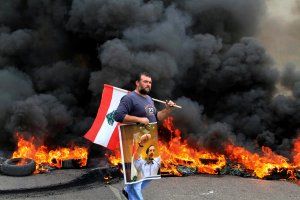
If Hizbullah weren't so smart, it wouldn't be so dangerous. This Shiite militia, created by Iran and backed by Syria, has never had a problem using force, naturally. It has been on the State Department list of terrorist organizations since the 1980s. Its guerrillas fought Israel to a standstill in 2006. Two years later, they took to the streets in Beirut to protect, not least, their business interests. But now that Hizbullah is in a position to govern—a position it got to through constitutional maneuvering—it's not acting like the overbearing Party of God so much as an éminence grise preferring to rule from the shadows.
Hassan Nasrallah, the black-turbaned mullah who leads Hizbullah with fiery rhetoric and cold political calculation, declared that "the greatest lie is that Hizbullah wants to seize the state and the government." As if to prove the point, the new prime minister that Hizbullah installed is an urbane, Harvard-educated Sunni billionaire, Najib Mikati. He served as the head of a "consensus" government six years ago and says he'd like to do the same today.
The Hizbullah takeover could not have come at a more delicate moment in the Arab world. The fall of Tunisia's dictator on Jan. 14 stripped away the sense of invulnerability, even inevitability, that has helped mafia-like regimes hold power throughout North Africa and the Middle East for decades at a time. In the last few days, growing unrest has hit Egypt, Algeria, and Jordan. Suddenly some of Washington's closest allies in the Arab world are being challenged by their own people. Those leaders are looking shaky, and nobody really knows who or what will replace them.
Hizbullah's government, by avoiding provocations and continuing to operate within the limits of Lebanon's Constitution, could actually present itself as an island of stability in this sea of Arab troubles. That, in turn, makes it hard for the United States, France, and other Western governments to put concerted pressure on this "terrorist" regime. Nobody wants another standoff like the one that followed the 2006 Hamas electoral victory in the Palestinian territories. Secretary of State Hillary Clinton, for her part, is being notably cautious. "As we see what this new government does, we will judge it accordingly," she told a press conference while on a visit to Spain.
At the center of Lebanon's political crisis and Clinton's concerns are allegations that Hizbullah and members of the Syrian government were responsible for the murder of former prime minister Rafik Hariri in Beirut on Feb. 14, 2005. That car bombing, which took 22 lives altogether, led to massive demonstrations a month later and the creation of what became known as the March 14 movement, which opposed Syrian occupation of the country, and eventually brought Hariri's son Saad to power as prime minister.
With strong support from the United States, Europe, and Saudi Arabia, where the Hariris made their fortunes, Saad backed the U.N. tribunal investigating his father's murder. When those investigators finally submitted their sealed indictments to prosecutors in The Hague, Hizbullah demanded Hariri back off and even denounce the tribunal. He refused, at least in public, while looking for a compromise in private. But one of Hariri's longtime allies in the March 14 movement, Druze leader Walid Jumblatt, decided to back Hizbullah and bring down the government.
Saad Hariri had never had much of a common touch. In 2006, when his country was under Israeli bombardment, he was in Italy much of the time. His reputation for ineptitude was enhanced when his secret testimony to the special tribunal recently leaked to the press. His remarks not only insulted the Syrians (he called President Bashar al-Assad "an idiot"), but even his own longtime patrons in Saudi Arabia. In one passing remark he referred to Mohamed bin Nayef, the head of Saudi counterterrorism operations and son of a likely heir to the Saudi throne, "a butcher." Even without that, some Saudi officials have been saying privately that their patience with Hariri had run out. "Hizbullah turned out to be way smarter than their enemies had said, and Saad Hariri turned out to be way more stupid than his friends had feared," says Lebanese blogger Amal Ghandour.
On Tuesday morning, even before the parliamentary vote for Mikati, Hariri's supporters called for a "day of anger." Roads in Beirut and the northern city of Tripoli were blocked with burning tires. Sporadic gun battles were also reported. Hundreds of Hariri supporters, mostly young men, marched through Nour Square in central Tripoli carrying signs critical of Hizbullah, including one that read "No to Hizbullah's Prime Minister." An Al-Jazeera TV crew was attacked and its van was torched. But hoped-for rallies in Beirut never materialized, and Hariri went on TV in the afternoon to call for calm. Game over.
Uncommon Knowledge
Newsweek is committed to challenging conventional wisdom and finding connections in the search for common ground.
Newsweek is committed to challenging conventional wisdom and finding connections in the search for common ground.





